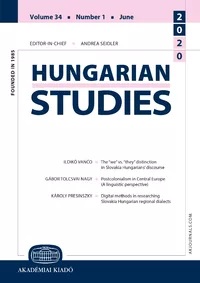An infinitive by any other name: On the non-finites in Hungarian, Finnish and Estonian grammars
An infinitive by any other name: On the non-finites in Hungarian, Finnish and Estonian grammars
Author(s): Johanna LaaksoSubject(s): Finno-Ugrian studies
Published by: Akadémiai Kiadó
Keywords: non-finites; infinitives; participles; converbs; grammar writing; Hungarian; Finnish; Estonian
Summary/Abstract: Non-finite verb forms, in-between verbs and nouns and also in-between inflection and derivation, pose challenges to grammar writing. In the largely Latin-based European grammar traditions, three or four main types of non-finites are often distinguished: infinitives, participles, verbal adverbs (gerunds, converbs), and – often most closely connected to the participles but classified as derivation rather than inflection – deverbal noun derivatives. Hungarian, Finnish, and Estonian, the three Uralic state languages with a strong tradition of written cultivation, are situated at the western end of the language family and display a strong “Europeanization” also in their systems of non-finites. Yet, these systems differ greatly even from each other. In this paper, the classification and nomenclature of non-finites in Hungarian grammars are compared with Finnish and Estonian. The Finnish grammar tradition is based on morphological substance but, failing to acknowledge the category of converbs, ends up exploiting the term “infinitive” in a way which is syntactically and semantically meaningless. The Estonian grammars vacillate between an opportunistic use of traditional European grammar terms and a simple listing of forms at a minimal level of abstraction. Hungarian grammars, in turn, present the non-finites in a way which is incompatible with other grammar traditions and is internally contradictory.
- Issue Year: 37/2023
- Issue No: 1
- Page Range: 107-122
- Page Count: 16
- Language: English
- Content File-PDF

